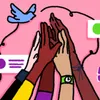Why strengthening local organisations is the need of hour
In communities across the country, local organisations have responded to this crisis with compassion and commitment.
Even before the pandemic, adolescents in India were already in crisis.
More than 80 percent of the country’s 253 million adolescents were suffering from ‘hidden hunger’ (undernutrition), nearly 40 percent of girls aged 15-18 weren’t attending school, and almost 20 percent of women aged 20-24 were married by age 15.
But the pandemic has made the grim reality into a full-blown disaster.
COVID-19 has created the largest disruption to our education systems in history. Not only are millions unable to attend classes (just 5 percent of adolescents in India live in a household that owns a computer), young people across the country are going without their midday school meal, weekly iron and folic acid supplements, free sanitary napkins, and nourishing social interactions.
Community leaders and campaigners have warned of spikes in school dropouts, child marriage, teenage and unwanted pregnancies, domestic violence, and online harassment – all linked to the effects of the pandemic. While children and adolescents are, thankfully, generally less clinically vulnerable to COVID-19 than adults, it is clear that the wider effects of COVID-19 are bearing down on our younger generations, deeply affecting their health, well-being, and future.
Despite this grim reality, there is – always – hope. In communities across the country, local organisations have responded to this crisis with compassion and commitment. They have delivered food, PPE, and emergency supplies, found ways to distribute contraceptives and other vital healthcare to teens, transformed their programmes to educate millions during a national lockdown, provided counselling services to the most vulnerable, and shared their data to improve the government’s response.
Once again, local organisations have proven themselves to be the backbone of our communities as they quickly adapted and expanded their work to serve the growing number of adolescents in need. These organisations have risen to the challenge of the moment.
As funders, we know that frontline organisations are best placed to respond to the needs of young people in their communities, yet their ability to act is too often undermined by the inhospitable funding environment we create.
Due to funding constraints, many local organisations entered the pandemic underfunded and overstretched. The pandemic has made this worse too.
Rather than the rigid grant structures, they need the flexibility that allows them to adapt quickly when disaster strikes.
Rather than specific project-based funding, they need unrestricted funding to direct resources where demand is greatest. They also need funding reserves to stay resilient through a crisis, rather than just relying on funding outputs.
Also, they need reliable, long-term funding to plan for a post-COVID-19 future rather than ad-hoc or single-year grants. Many partnership models are outdated and they reinforce false hierarchies. The organisation need trust, a platform, and real power.
And they need many more funders to behave in this way. That’s where collaboration comes in.
Philanthropists are drawn to collaboration for different reasons – pooling resources for cost efficiencies and greater impact, gaining specialist knowledge, and access to new networks – allowing more reticent funders the opportunity to explore new funding paradigms like those described above.
Despite being under enormous pressure, local organisations continue to do incredible work to support the millions of adolescents in India struggling with the effects of the pandemic.
For the above reasons, GMSP Foundation has joined the 10to19 Dasra Adolescents Collaborative (DAC) – a pioneering, multi-stakeholder platform uniting Indian and international donors, experts, local, state and national government officials, and strong grassroots civil society organisations to improve adolescent health and well-being in India.
The 10to19 Dasra Adolescent Collaborative’s (DAC) Ab Meri Baari initiative seeks to amplify the voices of adolescents who understand their own challenges and the solutions they need the most, and funnel those up to decision-makers within the government and civil society organisations. Efforts like these are critical to enable young people to access both physical and psycho-social support on their own terms as well as creating a space for them to cope and heal moving forward.
Edited by Kanishk Singh
(Disclaimer: The views and opinions expressed in this article are those of the author and do not necessarily reflect the views of YourStory.)







